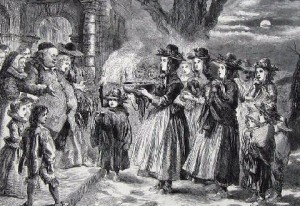 As traditional and familiar as most any English Christmas carol, the song is among the season’s more anachronistic, an evocation of a holiday custom that pretty much puzzles modern celebrants: wassailing.
As traditional and familiar as most any English Christmas carol, the song is among the season’s more anachronistic, an evocation of a holiday custom that pretty much puzzles modern celebrants: wassailing.
Wassailing? What’s wassailing?
The text of the carol employs noun and verb forms of “wassail,” a word derived from the Old Norse ves heil and the Old English was hál and meaning “be in good health” or “be fortunate.” The phrase found first use as a simple greeting, but the Danish-speaking inhabitants of England seem to have turned was hail, and the reply drink hail, into a drinking formula adopted widely by the indigenous population of England.
Wassail also denoted the drink used for the toast. Rowena’s—Renwein in English—spiced wine resembled the ancient Roman hypocras, which survived into the early Middle Ages as a libation for the wealthy. The necessity of importing the wine and such spices as ginger, cinnamon, cloves, allspice, and nutmeg from outside England made it dear. When fine ales replaced the wine, more people could afford it, and recipes varied according to the means of each family. Though usually prepared for immediate consumption, wassail sometimes was bottled and allowed to ferment.
The term has evolved in English for more than a millennium, from its origins as a simple greeting, to its use as a toast in ritualized drinking, to its absorption into holiday customs rooted in notions of social propriety.
The first mention of a wassail bowl was in the thirteenth century, a vessel in which revelers dipped cakes and fine bread. The practice of floating crisps of bread in the wassail bowl gave rise to our use of “toast” as a drinking salutation.
- “Toasts”
- Christmas parties
- Christmas bonuses
- Punch bowls (Think eggnog)
From Wassailing Through History
So lift your cups and join me now is I say was hál to this strange and wonderful old English tradition. And you thought wassailing was just a fancy name for caroling.
